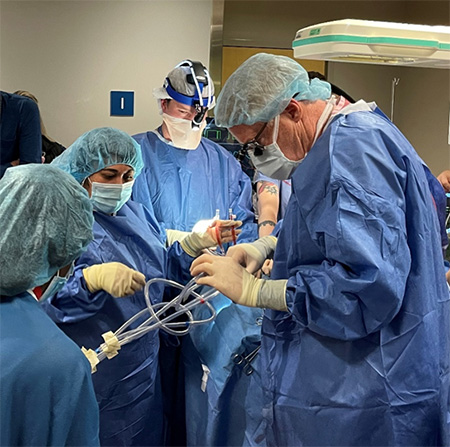Extracorporeal membrane oxygenation (ECMO) continues to be one of the most complicated therapies provided to infants, children and adults with critically-ill heart and lung disease. Physicians must have expertise with complex ECMO circuitry and advanced knowledge of cardiopulmonary physiology—all while rapidly responding to a patient’s life-threatening needs. In short, experience matters..
“Providing ECMO to infants and children is complex and intricate. It takes integrated and multidisciplinary teamwork between surgeons, nurses, and the ICU. We have one of the highest-volume ECMO centers in the world,” says Eva Cheung, MD, Medical Director of Pediatric ECMO at NewYork-Presbyterian Morgan Stanley Children’s Hospital, who notes that the team performed 50 cases in 2022.
Pushing the Envelope
As one of the earliest institutions to provide ECMO to children in 1983, NewYork-Presbyterian Morgan Stanley Children’s Hospital has a long history with the life-saving therapy. Currently, it is the largest infant and pediatric ECMO center and the only designated Platinum Center of Excellence by the Extracorporeal Life Support Organization (ELSO) in the tri-state area. This designation is ELSO’s highest ECMO honor and is currently only given to 37 institutions worldwide. Dr. Cheung notes that NewYork-Presbyterian Morgan Stanley has consistently operated above the 90th percentile in center ECMO volume for many years.
“Our history and volume allow us to operate at an advanced level, and because of this high volume, we have been able to gain experience using the latest technology and treat diseases of the highest complexity and acuity. We are able to push the envelope,” says Dr. Cheung.
“Our ECMO program supports a congenital heart disease program that performs very innovative surgeries and therapies. It supports a Pediatric ICU and a Neonatal ICU, which are the largest in New York City.” — Dr. Eva Cheung
Dr. Cheung and the pediatric ECMO team not only invest in continuous staff training but also place special importance on using the highest quality technology. NewYork-Presbyterian Morgan Stanley Children’s Hospital uses one of the smallest and lightweight ECMO systems, called the Cardiohelp System by Maquet. “Only about a half a dozen hospitals across the country exclusively use this technology like we do. As one of the smallest devices in existence, it offers efficiency in operation, a low complication rate, and we can transport it all over and outside hospital,” says Dr. Cheung.
Experience (And Practice) Matters
One of the ways that the pediatric ECMO team at NewYork-Presbyterian Morgan Stanley Children’s Hospital stays on top of their game is practice. Led by Tarif Choudhury, MD, Director of Clinical Simulation for Pediatric Critical Care Medicine, the group regularly conducts simulation training in an ICU-converted simulation suite in the Hospital, complete with a high-fidelity manikin, an ECMO neck vessel attachment that allows for surgical incision, cannulation of vessels, and connection to the ECMO circuit for simulated blood transference through the machine. The converted simulation suite is designed to be a replica—everything from the room dimensions to the equipment used—of an actual ICU bed space at NewYork-Presbyterian Morgan Stanley Children’s Hospital. Interdisciplinary teams respond to the simulated emergency with equipment that would be used in a real in-hospital cardiac arrest. The room is adorned with high-quality cameras and microphones allowing Drs. Choudhury, Cheung, and William Middlesworth, MD, Director of Pediatric ECMO at NewYork-Presbyterian Morgan Stanley Children’s Hospital, to review and analyze the sessions and provide important performance feedback to the team.

Pediatric extracorporeal membrane oxygenation (ECMO) team members undergo simulation training at NewYork-Presbyterian Morgan Stanley Children’s Hospital.(Source: Image courtesy of Tarif Choudhury, MD)
"Under the leadership and vision of Drs. Cheung and Middlesworth, [extracorporeal cardiopulmonary resuscitation (eCPR)] simulation has allowed a platform to identify how work imagined compares to work realized. Interdisciplinary eCPR simulation is a true gamechanger in patient safety and hospital team dynamics," says Dr. Choudhury.
Multidisciplinary Team
The Pediatric ECMO team closely collaborates with multiple pediatric subspecialties to provide comprehensive care to each and every ECMO patient. This close collaboration is paramount to the program’s success.
“It is a modality of treatment, but it is really the teams—the incredible surgeons, intensive care physicians, and amazing intensive care nurses—that are very committed to providing ECMO care at the highest level,” says Dr. Cheung.
Dr. Choudhury is examining the impact of ECMO simulation training and the group has plans to publish their findings. The team plans to analyze the video- and audio-recorded sessions to identify points in an eCPR event where the interdisciplinary teams are most vulnerable in their resuscitative performance, and then develop strategies for improvement. Additionally, the researchers will be measuring participants self-reported knowledge and confidence levels, and longitudinally tracking how real-life outcomes correlate with the frequency of simulated eCPR sessions. Ultimately, the goal is to strengthen the skills needed for rapid management and improve interdisciplinary team dynamics.
Training and Education
NewYork-Presbyterian/
Dr. Cheung is heavily involved in research and quality improvement on ECMO “We are constantly interested in the impact of ECMO, how to better our practices, and how to better understand what it does to patients long-term,” says Dr. Cheung, who is part of several multi-institutional trials including the ASCEND trial.
Emergency Transfer Program
As a major national and international referral center for children with congenital heart disease and other life-threatening conditions, NewYork-Presbyterian Morgan Stanley Children’s Hospital has the ability to transport even the sickest children. “Often, we see patients that other institutions would not consider putting on ECMO. Our ECMO program supports a congenital heart disease program that performs very innovative surgeries and therapies. It supports a Pediatric ICU and a Neonatal ICU, which are the largest in New York City. We care for infants and children of the highest degree of critical illness on ECMO and hope to provide the highest quality care with the most innovative technology for the best outcomes” says Dr. Cheung.
To coordinate patient transfers when tertiary and quaternary care is required, physicians can contact the NewYork-Presbyterian ECMO transport program (1-800-NYP-STAT).



